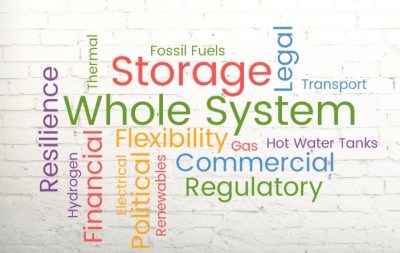
Energy Storage is an inherent part of the UK’s energy system – providing key benefits such as flexibility, resilience and system security.
Fossil fuels currently provide large volumes of long duration storage over a period of months, meaning economic and technically simple storage solutions are already in existence. Other ‘invisible’ forms of storage such as domestic hot water tanks and storage heaters, also provide capabilities that are at risk of being lost.
New challenges for maintaining and replacing storage assets at various scales are being created by changes to the energy system. Increasing levels of renewable technologies, electrification of heat and transport, the phasing out of coal, the potential use of Hydrogen, and the future role of gas and whether it can be decarbonised, will all affect the future levels and types of storage.
A key challenge is therefore to replace the current high value, low cost solutions that are already in place and provide storage that accounts for daily fluctuations, as well as variations over several weeks, months or seasons, in a cost effective manner with whole-system benefits.
ERP’s latest project in this area notes that storage provisions are much wider than purely electrical storage, and therefore considers system-wide energy storage types (including electrical, thermal, gas, hydrogen and transport). The work additionally recognises the diverse range and scales of storage solutions and the advantages of system-level controllability, whilst highlighting alternative options for the provision of system services, such as Demand Side Response and Interconnection.
The project’s key aims are to uncover the financial, legal, political, commercial and regulatory barriers to energy storage deployment and with the following types of questions discussed:
- What is the whole system need for storage?
- Where there is a need – what considerations and conditions are required to enable storage to compete?
- How can the services storage offers (e.g. flexibility, resilience and system security) be appropriately valued?
ERP welcomes your views and inputs in relation to the questions above. To engage with us, please comment on the #ESbarriers Twitter debate. For further information and more general comments, please contact ERP Analyst Helen K Thomas.
The Barriers to Energy Storage report will be publicly available on our website and is due out in October 2016.
